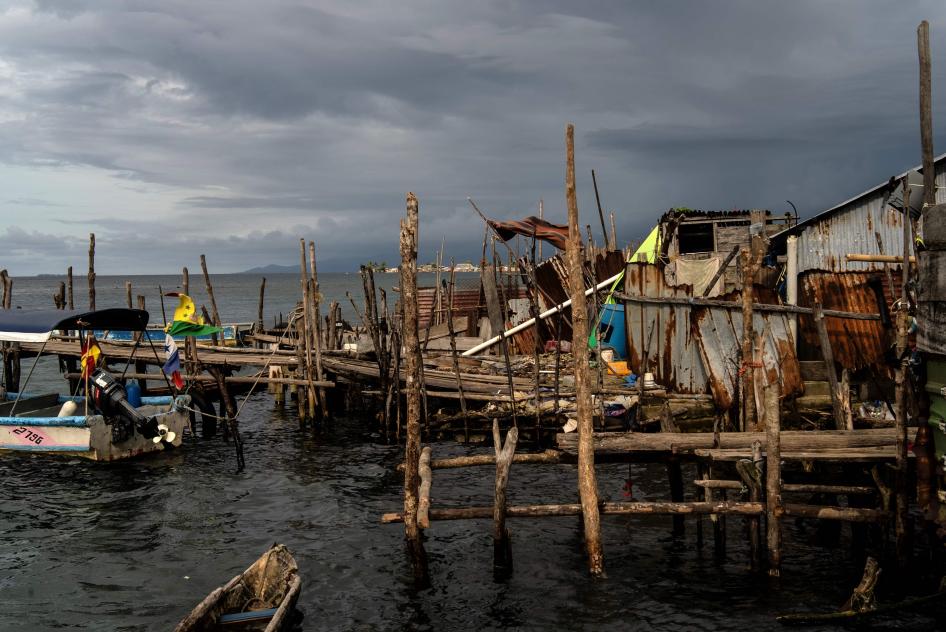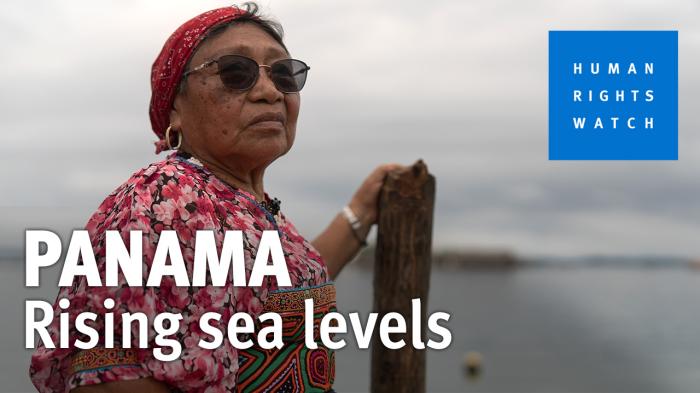The Guna people have been on the coast of Guna Yala [in Panama] for over 100 years.
The ancestral knowledge and experience of the Guna people contributes a lot towards [fighting] climate change.
We will leave the island and move to the mainland because the circumstances warrant it // due to overcrowding, as we already have a large population on the island, // and many families live in cramped conditions.
That’s why it became a priority for us to move to the mainland.
This is Gardi Sugdub a small island off the coast of Panama, as in 1984. // It’s been home to the Indigenous community for generations.
Nearly four decades on, a growing population and rising sea levels have led the community to make the courageous decision to relocate to the mainland.
They have asked for the government support to do so with dignity.
Almost 50% of the problems we have on the island // are related to housing shortages, lack of proper waste management // infrastructure and water issues.
Climate change is intensifying every year.
The relocation project is the initiative of the people and the Gardi Sugdub community, // and it’s an ambitious project.
It is one of many communities that is currently undertaking relocation related to sea level rise and other climate change impacts.
Panama could be the first country in the Americas to take relocation planning seriously at a national level. // but to date the Gardi Sugdub project is not going to plan.
The president committed to delivering it [the new relocation site] in September [2023], but we doubt it will happen.
The government agreed to build 300 new homes and provide potable water, sanitation, and road access services at the relocation site.
But the new site, which is on the mainland, isn’t finished, and no one has yet relocated.
The Ministry of Housing has once again delayed the relocation date from September 2023 to February 29, 2024.
They [the government] have to support us in relocating 300 families. // That is the first thing we think about, what the move will be like.
Everyone with their canoe, their little boat, // and a significant number of people to move, it’s incredible, incredible.
The government should pay much more attention to that.
Well, my school is not in good condition because the street flood when it starts raining. // Sometimes inside the classrooms, // drops fall which create puddles
inside the room, so we get wet.
Naila’s school is deteriorating from water damage, with walls visibly cracking and crumbling behind large damp areas.
The biggest advantage for us would be to move to the new place [the relocation site] and have a better-quality education.
At the government level, the environment authority is responsible for the environment // but there is no plan, no public policy, or resettlement plan.
We have been waiting for this project for over ten to 15 years.
Some community members feel they have not been included in the planning for the relocation project.
Initially, our idea was to build our traditional homes using thatched roofs and bamboo walls.
But the government, without consulting us, assigned us the housing units.
If they had listened to us and considered our feelings // and the community had been part of it, it would have been very different. // We could have kept our identity.
The Ministry of Housing doesn’t have a plan to address these challenges when Indigenous people want to relocate.
There is a lack of national strategy for climate change.
The government should ensure inclusive community participation, develop policy, and allocate funds
to support Gardi Sugdub and other planned relocations of communities facing sea level rise in the future.
The initiative of the Gardi community to relocate can serve as an example and a model.
However, there is still much to be done, // the government planning and approach should match the communities’ aspirations.
Yes, it has been a great hope, almost 13 years of struggle, // 13 years of work.
Many of the people who started cleaning the land, searching for the ideal place, have passed away.
But we are still here.
It can be a joy for our children, our grandchildren.
It can also be a joy to be the first // because communities that have to move to the mainland // will have a model and will be able to fight to improve the process and fight.
They will be able to demand what they desire.
Producer/Editor – Ellie Kealey; Producers- Erica Bower, Pamela Vacacurva, Blas Lopez: Videographers – Wagua Films, Pamela Vacacurva; Music, Audio Network.








